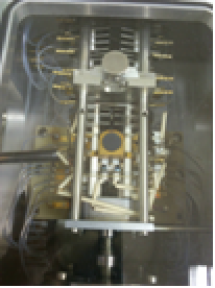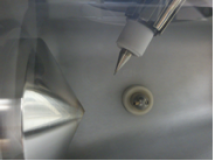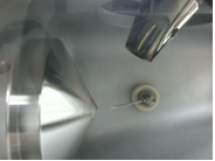Ionization techniques
Electron ionization (EI+ 70 eV)
 Ionization in a gas phase under vacuum. Substances must be volatile enough as well as thermally stable.
Ionization in a gas phase under vacuum. Substances must be volatile enough as well as thermally stable.
Acqusition modes:
low (unit) resolution
high resolution - mass accuracy better than 5 ppm
EI+70 eV advantages:
- universal ionization technique
- mass spectral databases and libraries available - NIST, Wiley
- reliable identification of low-molecular weight analytes
EI+ 70 eV disadvantages:
- limitation in substance molecular weight (gas phase ionization - substance must be evaporated) - typically molecular weight up to 1000 Dalton (Da), 2000 Da for compounds volatile enough (e.g. florinated etc.)
- substance must be thermally stable
- hard ionization technique, due to high energy are molecular ions fragmented, absence of the molecular ion in a mass spectrum of some substances e.g. branched alkanes.
Electrospray ionization (ESI)
 Atmospheric ionization technique. Ionization from a solution. ESI is connected with a reverse phase HPLC, typical solvents are methanol and acetonitrile or their mixture with water. By this ionization multiple-charged ions can be formed as well as adducts of molecular ions with natrium (Na) or potassium (K).
Atmospheric ionization technique. Ionization from a solution. ESI is connected with a reverse phase HPLC, typical solvents are methanol and acetonitrile or their mixture with water. By this ionization multiple-charged ions can be formed as well as adducts of molecular ions with natrium (Na) or potassium (K).
Acqusition modes:
- positive or negative mode
- low or high resolution - mass accuracy 1-2 ppm (with the use of Lock Mass)
- hybrid mass spectrometer enables high resolution MS/MS experiments
ESI advantages:
- soft ionization technique, suitable for high-molecular weight compounds, possible detection of ion compounds from their solutions
- molecular ion adducts in mass spectrum
ESI disadvanteges:
- not universal ionization (usually suitable only for polar or moderate polar compounds)
- not suitable for non-polar compounds
Atmospheric pressure chemical ionization (APCI)
 Atmospheric pressure ionization, ionization occurs at quite high temperature (400 oC), solvent and analyzed substances are vaporized and ionized in an electric field by corona discharge.
Atmospheric pressure ionization, ionization occurs at quite high temperature (400 oC), solvent and analyzed substances are vaporized and ionized in an electric field by corona discharge.
Acqusition modes:
- positive or negative mode
- low or high resolution - mass accuracy 1-2 ppm (wit the use of Lock Mass)
- hybrid mass spectrometer enables high resolution MS/MS experiments
APCI advantages:
- suitable for compounds of lower polarity than ESI
APCI disadvantages:
- compounds must be more thermally stable than by ESI
- suitable for compounds with molecular weight up to 1000 Da
- not suitable for non-polar compounds
